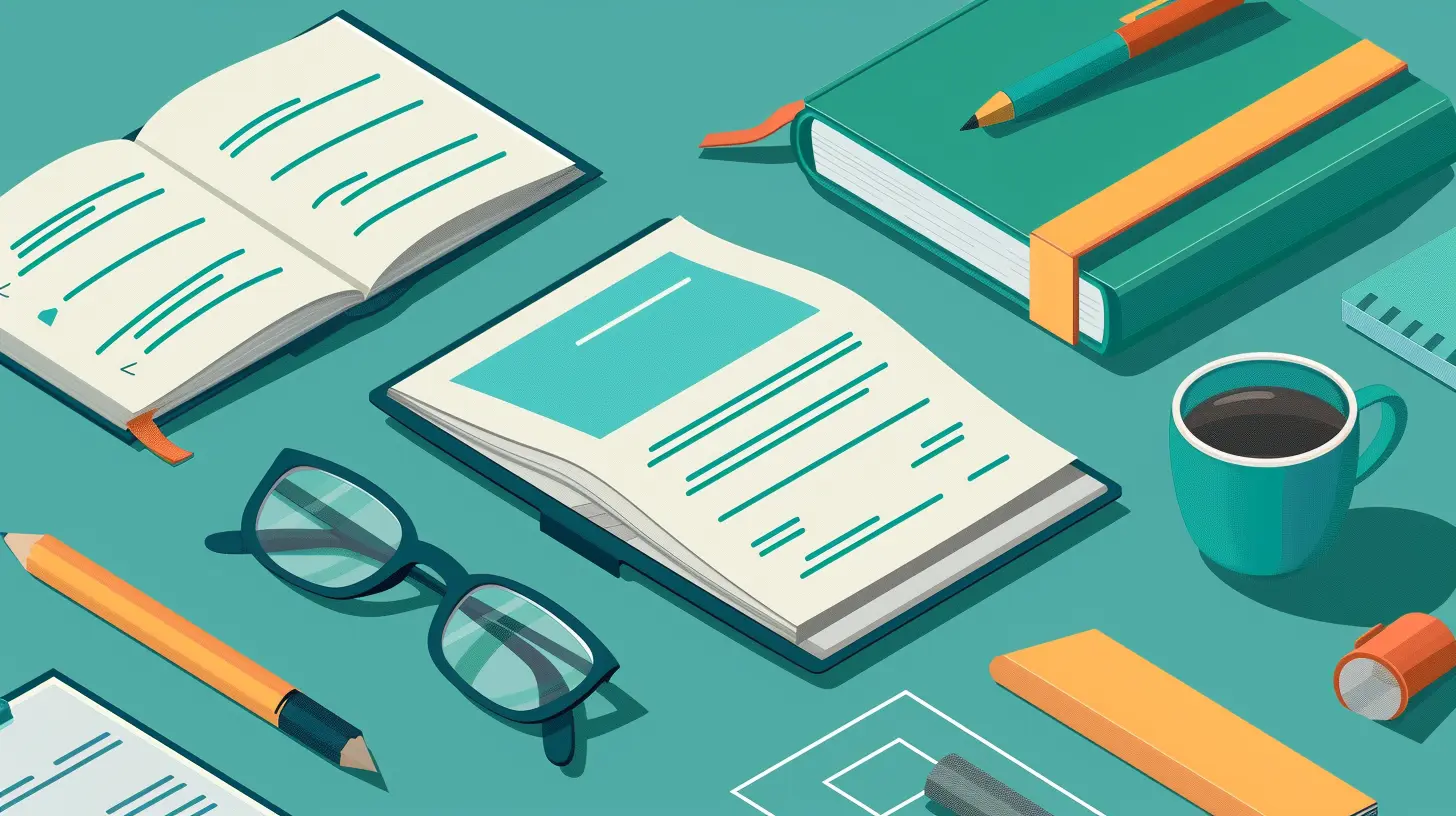How to Use Self-Assessment to Gauge Your Progress in Any Subject
30 September 2025
How often do you find yourself wondering if you're actually improving in the subject you're studying? Whether it's mastering a new language, acing math problems, or honing your writing skills, it’s essential to know where you stand. But here's the thing—how do you really know if you're making progress? One fantastic way to figure it out is through self-assessment.
Now, self-assessment sounds fancy, doesn’t it? But in reality, it's one of the simplest and most effective tools you can use to gauge how well you're doing. It’s like having a mirror for your mind, reflecting back what you've learned and where you might still be struggling. And the best part? You don't need anyone else to do it!
In this article, we’ll break down how to use self-assessment to track your progress in any subject. So, buckle up as we explore the ins and outs of this method.

What is Self-Assessment?
Before we dive into the how, let’s understand the what. Self-assessment is exactly what it sounds like—assessing yourself. It involves critically evaluating your own performance, skills, and understanding to determine areas where you excel and areas that need improvement.Think of it like a personal progress report, but instead of a teacher or boss giving you feedback, you’re the one holding the pen. The beauty of this is that it promotes self-awareness and encourages independent learning.
But wait—does that mean you’ll never need feedback from anyone else? Absolutely not! Self-assessment is just one tool in your learning toolbox. It complements external feedback, helping you grow more efficiently in any subject.

Why is Self-Assessment Important?
Why bother with self-assessment? Can't you just wait for the next test or assignment to see how you're doing?Well, let me ask you this: would you wait until the end of a race to check if you’re heading in the right direction? Probably not. Regularly gauging your progress helps you course-correct before it’s too late. Here are a few reasons why self-assessment is crucial:
- Encourages Active Learning: Instead of passively absorbing information, self-assessment forces you to actively engage with the material. You’ll be asking yourself questions like, “Do I really understand this?” or “Can I explain this concept clearly?”
- Identifies Strengths and Weaknesses: When you self-assess, you pinpoint the areas where you shine and the ones where you need to work harder. This can help you focus your study time more effectively.
- Boosts Confidence: Seeing your own progress can be a huge confidence booster. It’s a tangible way to remind yourself that you’re improving, even when it feels like you’re stuck.
- Fosters Accountability: When you regularly evaluate your own learning, you take responsibility for it. You’re not waiting for someone else to tell you how you’re doing—you’re in control.

How to Use Self-Assessment in Any Subject
Now that we’ve covered the why, let’s move on to the how. How do you actually use self-assessment to gauge your progress in any subject? Below are some simple yet effective strategies that you can apply to any learning situation.1. Set Clear Goals
Before you can assess your progress, you need to know what you're aiming for. This is where goal-setting comes in. Your goals should be specific, measurable, achievable, relevant, and time-bound (SMART goals, anyone?). Without clear goals, it’s hard to know if you’re moving in the right direction.For example:
- If you're learning a new language, your goal could be to hold a 5-minute conversation in that language by the end of the month.
- If you're studying math, your goal might be to solve at least 10 algebra problems without any mistakes by the end of the week.
Once you’ve set your goals, you have a benchmark to measure against.
2. Keep a Learning Journal
A learning journal is an excellent way to document your progress. It’s like a diary, but instead of writing about your day, you jot down what you’ve learned, what you found challenging, and what you plan to focus on next.Here’s how it works:
- Daily Entries: After each study session, write down what you covered and how well you understood it. Be honest with yourself here; if something didn’t click, make a note of it.
- Weekly Reflections: At the end of each week, review your entries. Did you meet your goals? If not, why? What adjustments can you make?
This kind of reflection helps you track your progress over time and gives you a clear picture of where you stand.
3. Quizzes and Practice Tests
Self-assessment doesn’t just have to be about writing things down. One of the most straightforward ways to test your knowledge is through quizzes and practice tests. They’re like mini pop quizzes that you give yourself, minus the pressure.- Create Your Own Quizzes: After studying a topic, come up with a set of questions to test your understanding. If you can answer them confidently, you’re on the right track. If not, you know where to focus your energy.
- Use Online Resources: If creating your own quizzes feels overwhelming, don't worry. There are tons of online resources that provide practice questions for different subjects.
Remember, the goal here isn’t to get a perfect score—it’s to identify gaps in your knowledge so you can improve.
4. Teach What You’ve Learned
Ever heard the saying, “If you can’t explain it simply, you don’t understand it well enough”? This is where teaching comes in. One of the most effective ways to assess your knowledge is by teaching the material to someone else.Here’s how you can do it:
- Explain Concepts to a Friend: Find a study buddy and take turns teaching each other what you’ve learned. If you can explain the concept in a way that makes sense to someone else, you’ve got it down.
- Teach Yourself: If you don’t have a willing friend, try teaching the material to yourself. You can even pretend you’re explaining it to an imaginary student. The act of verbalizing the information forces you to think critically and ensures you understand the material.
5. Use Checklists
Sometimes, all you need is a good old-fashioned checklist. This is especially useful for subjects with multiple concepts or skills. Break down the material into smaller chunks and create a checklist of the key things you need to know.For example:
- If you’re studying history, your checklist might include key dates, events, and figures.
- If you’re learning a musical instrument, your list could include different techniques or songs you need to master.
As you go through your checklist, mark off the items you feel comfortable with. This gives you a visual representation of your progress and helps you stay organized.
6. Record and Review Your Performance
This one’s particularly useful for skills that can be performed, like public speaking, writing, or even playing an instrument. The idea is simple: record yourself in action, then review the recording to assess your performance.- For Writing: Write essays or reports, then set them aside for a few days. When you come back to them with fresh eyes, you’ll have a better sense of where you can improve.
- For Speaking: Record yourself giving a speech or presentation. Watch the recording and take note of areas where you stumbled or could improve your delivery.
- For Music or Sports: Video yourself practicing a piece of music or performing a specific skill. Watching the playback can reveal things you didn’t notice in the moment.
7. Seek Feedback (But Keep It Balanced!)
While self-assessment is all about evaluating yourself, it’s still important to get occasional feedback from others. Sometimes we have blind spots, and an outsider’s perspective can help you see things you might’ve missed.That said, don’t rely on external feedback too much. Use it to complement your self-assessment, not replace it.

Common Pitfalls to Avoid
When it comes to self-assessment, it’s easy to fall into a few traps. Here are some common mistakes and how to avoid them:- Being Too Hard on Yourself: It’s easy to focus on what you don’t know. Remember to celebrate your wins, no matter how small.
- Overestimating Progress: On the flip side, don’t assume you’ve mastered something just because you understand it on a surface level. Dig deeper.
- Not Being Consistent: Self-assessment only works if you do it regularly. Make it a habit to evaluate your progress after each study session.
Conclusion
Self-assessment is an incredibly powerful tool for gauging your progress in any subject. By setting clear goals, keeping a learning journal, taking quizzes, teaching others, using checklists, and recording your performance, you can take control of your learning journey.Remember, the key to effective self-assessment is honesty and consistency. You’re not just trying to pat yourself on the back or beat yourself up—you’re trying to get an accurate picture of where you are so you can improve. So, the next time you sit down to study, ask yourself: How am I doing? And then, take the time to find out.
all images in this post were generated using AI tools
Category:
Self AssessmentAuthor:

Anita Harmon
Discussion
rate this article
1 comments
Rex Riley
Great insights on self-assessment! Incorporating regular check-ins can truly enhance learning. I especially appreciated the tips on setting specific goals to measure progress effectively.
October 11, 2025 at 10:59 AM

Anita Harmon
Thank you for your feedback! I'm glad you found the tips helpful for enhancing learning through self-assessment.


